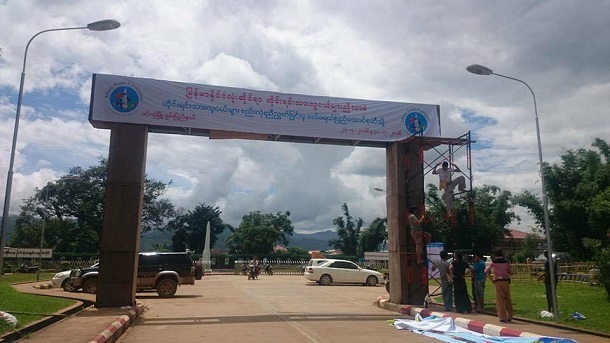RANGOON — An editorial in the Burmese state-run newspaper The Mirror has argued that the construction of the highly controversial Chinese-backed Myitsone Dam in Kachin State—suspended since 2011—should be completely abandoned, because it harms relations between Burma and China.
State-run media in Burma have previously taken a cautious line on the project, and avoided overt criticism.
The editorial claimed that the message of the people of Burma to China—“don’t mess up the Irrawaddy”—was “crystal clear.”
The editorial backed the “fourth option” for the Myitsone Dam, namely the total cancellation of the project: “both countries should look for hydropower projects that can be mutually acceptable,” it concluded, echoing Kristensen’s recommendation.
Popular approval of The Mirror’s Sunday editorial was evident on social media. Moe Thway, who leads youth organization Generation Wave, wrote a post on Facebook urging the government to follow the editorial’s suggestions.
“I will stand with the public to support the new government,” Moe Thway concluded.
The US$3.6 billion hydropower dam project is situated just downstream of the confluence that forms Burma’s most iconic river, the Irrawaddy, and was intended to supply power mainly to China’s relatively underdeveloped southwest.
The project was a joint venture inked between a Chinese state-owned corporation, China Power Investment (CPI), the Burmese Ministry of Electric Power and a Burmese conglomerate, Asia World, during the time of the military junta.
In 2011, the project was suspended by President Thein Sein until the end of his term in 2016, after a sustained public outcry and claims that the dam would disrupt the flow of sediment in the country’s main waterway, disrupt agricultural livelihoods downstream, and pose grave flooding risks in the event of an earthquake, due to its proximity to a fault line.
This editorial from a state-run newspaper comes on the back of renewed lobbying from China to resume the project.
In early June, the Chinese Ambassador Hong Liang and representatives of CPI travelled to Kachin State to meet with local leaders.
On April 5, five days after the National League for Democracy (NLD) government assumed office, China’s Wang Yi became the first foreign minister of another nation to meet Aung San Suu Kyi, Burma’s new foreign minister—although the Myitsone Dam and other controversial Chinese investments were reportedly not discussed.
The Mirror editorial was published on the same date—July 24—that Suu Kyi held a meeting with Wang Yi in Vientiane, the capital of Laos, on the sidelines of the 49th Asean Foreign Ministers Meeting, although the Myitsone Dam was reportedly not on the agenda.
After the meeting with Suu Kyi, the Chinese foreign minister addressed a press conference, saying that, “the Myitsone Dam issue will not harm the two countries’ future relationship,” as reported by Eleven Daily.
Suu Kyi is projected to visit China, following an invitation from the Chinese foreign minister, prior to a planned trip to the US in September.
During its tenure so far, the NLD has yet to utter a word on the eventual fate of the Myitsone Dam, leaving uncertainty on all sides.
Back in 2011, when she was an opposition figure, Suu Kyi issued a statement encouraging public campaigns to “save the Irrawaddy.” She also appealed to the governments of both China and Burma to avoid “endangering” the lives and homes of the Kachin people, to take note of the earthquake risks and to consider the environmental impacts.
“In the interests of both national and international harmony, concerned parties should reassess the scheme and cooperate to fund solutions that would prevent undesirable consequences and thus allay the fears of all who are anxious to protect the Irrawaddy,” she said.
Win Myo Thu, director of environmental organization EcoDev Myanmar, said the Chinese company backing the dam would have to gather public consensus before proceeding with the project—a highly unlikely prospect.
“Sixty-percent of Burma’s population would be affected by the project,” Win Myo Thu claimed. The company should try to get a yes-vote from them, he said mockingly.
“The Chinese company must accept the harsh reality that they must shut down the project,” he concluded.

















